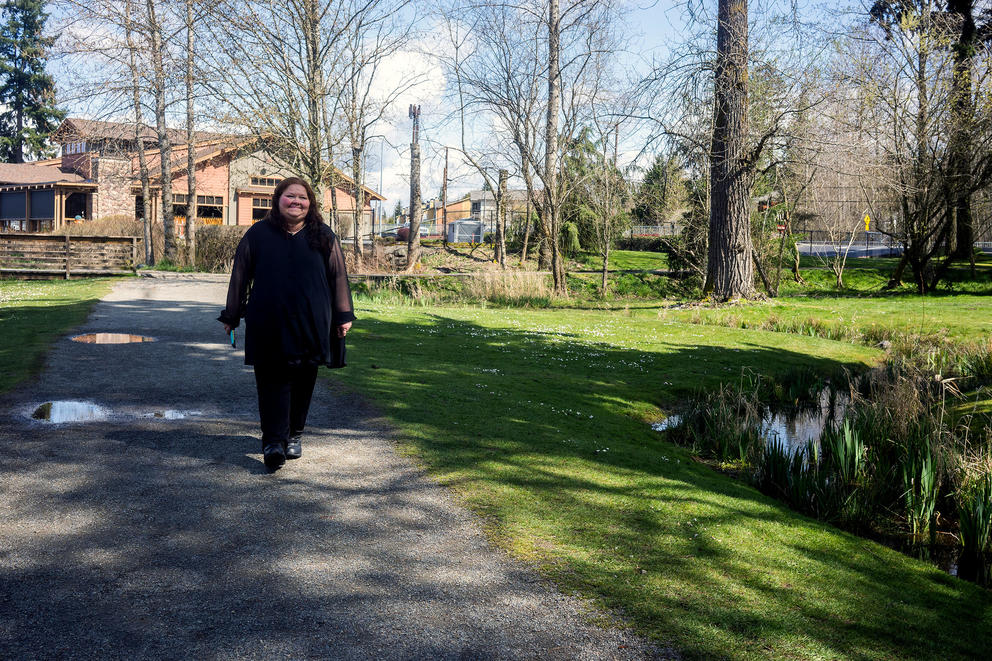Osborne could soon get her wish. State lawmakers are considering a bill that would tighten the standards for removing children from their parents and ensure that disability, poverty, inadequate housing and other conditions that don’t necessarily pose an imminent threat to a child’s physical safety cannot be the only reasons to take kids away. The bill also would make it easier for relatives to foster children who can’t remain safely with their parents.
InvestigateWest is a Seattle-based nonprofit newsroom producing journalism for the common good. Learn more and sign up to receive alerts about future stories at http://www.invw.org/newsletters/
The bill, called the Keeping Families Together Act (House Bill 1227), was the brainchild of a group of more than a dozen parents, foster parents, lawyers, foster care agencies and other advocates who started meeting last summer under the guise of “turning foster care on its head.” While marchers were loudly protesting the deaths of Black women and men at the hands of police, this group quietly strategized how to overhaul another institution disproportionately harming families of color: the child welfare system.
A key goal of the legislation is reducing the overrepresentation in foster care of Black and Indigenous children, who are about twice as likely as their white peers to be placed in care, according to a 2019 state analysis. Sponsors hope it would also cut the total number of kids, now about 7,300, in the state’s overburdened foster care system.
Instead of paying strangers to care for their children in foster care, if the state helped the parents at risk because of poverty, mental illness or addiction, many of those children and families would fare better, the act’s proponents say. Most victims of child maltreatment, 61%, experience neglect but no other mistreatment, according to 2019 federal data.
“Poverty should never be a reason for removing children from homes,” said state Rep. Lillian Ortiz-Self, D-Everett, the bill’s prime sponsor in the House. An amended version of her bill has passed the Senate and awaits a final vote in the House.
Ortiz-Self is also a school mental health counselor who works with young people who have been taken from their parents. “I have seen their anguish and trauma … and their desire to be reunified with their families,” she said. “Which screams to me that we should be doing everything in our power to make sure that is the absolute last resort.”
Current law gives police, hospitals, child protective services and courts “a ton of discretion” to remove children, said Tara Urs, civil practice and policy director at the King County Department of Public Defense, which represents parents who have had their children removed. It’s “a wide-open door,” Urs said.
The bill would limit that discretion by requiring evidence that removal “is necessary to prevent imminent physical harm,” including harm from neglect.
The model for that language comes from the 1978 Indian Child Welfare Act, which sought to reduce the common practice of removing Native American children from their families and tribes and placing them with white families.
The Keeping Families Together Act also spells out specific circumstances that do not, by themselves, constitute imminent physical harm, including poverty, isolation, the parent’s age, crowded housing, substance abuse, mental illness, a parent’s or child’s disability, or “nonconforming social behavior.” And judges must return children to their parents unless there is evidence that conditions in the home are actually causing imminent physical harm.
These proposals are driven in part by a growing recognition that the foster care system is failing many youths, and that reform efforts in the past have made only marginal improvements.
In recent years, hundreds of Washington foster children have been kept in hotels and offices and sent to out-of-state institutions with histories of abusing children. The frequent moves that many foster children experience, research shows, contribute to worsening behavior problems.
Locally and nationally, there is a growing consensus that foster care is overused and more emphasis should be placed on keeping families intact. The 2018 Family First Prevention Services Act supports that goal nationwide by allowing states to redirect federal foster care matching funds toward family preservation.
“The nation and states have been somewhat cavalier about the traumatic impacts of removal,” said Frank Ordway, chief of staff of the Washington Department of Children, Youth & Families, which oversees Child Protective Services and foster care.
Decisions about whether to remove a child, Ordway said, have largely been driven by immediate safety concerns, along with avoiding lawsuits should the department fail to act and a child is harmed. The bill would require more consideration of long-term impacts to children, he said.
“You have to weigh, can we provide some more immediate support to this family and keep them together, versus breaking them apart, putting them into therapy and then trying to put them back together?” Ordway said. “What this bill is trying to do is make us think a little more, take a little bit more time in those beginning steps, before inextricable damage is done.”
A second major provision of the act seeks to tackle racial disparities by reducing the barriers for grandparents and other relatives and close friends to care for children.
Families of color are more likely to have had contact with the criminal justice system and thus are more likely to be rejected as potential relative caregivers. As a result, Urs explained, “the child welfare system imports the structural racism of the criminal legal system.”
Under the proposed legislation, the state would have to prove that a relative is unfit to care for a child, rather than relatives having to prove their fitness to the state, Urs said. A delayed background check, a home that is too small or a relative’s uncertainty about adopting a child would no longer disqualify them. And courts could order the Department of Children, Youth & Families to provide financial or other supports to relatives to ensure their home is safe.
That “brings me great elation,” said Shrounda Selivanoff, director of public policy with the Children’s Home Society of Washington and a member of the working group that helped craft the Keeping Families Together Act.
Selivanoff said that when her grandson was born three years ago, the Department of Children, Youth & Familes initially objected to placing the baby with her. That’s because one of Selivanoff’s children had been removed at birth more than a decade earlier. But Selivanoff had completed treatment for a drug addiction, and her daughter had come home after 2½ years.
“Who I was 10 years ago doesn’t say who I am today,” Selivanoff said. “So we are shifting the burden back to the state to say, ‘What makes me unsafe today?’ ”
Equally important, the bill would provide financial assistance for relatives who care for kids. These extended-family members tend to be older and poorer than licensed foster parents but receive far less support from the state. Kin can get $363 a month for one child and about $100 more for each additional child through the Temporary Assistance for Needy Families program. Payments to licensed foster parents start at $672 per child and reach $1,612 a month for older children with complex needs.
If relatives indicate they are interested in becoming licensed, the bill requires the state to start the process within 10 days, issue an initial license and begin paying them the same amount they pay licensed foster parents. A second bill being considered this session (House Bill 5151) would allow the Department of Children, Youth & Families to issue “child-specific” licenses for relatives, thereby drawing on federal matching funds to pay those relatives.
These payments to relatives and other costs to implement the Keeping Families Together Act will be significant, but lawmakers avoided having to budget for them this year by delaying the act’s implementation until July 2023.






